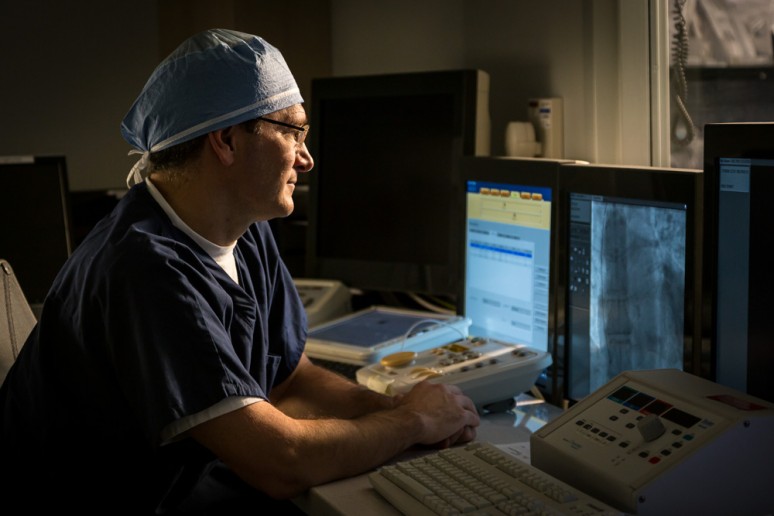“In my youth, I had no idea what I was going to be,” Dr. Marc Silver says. He spent most of his formative years in Michigan, and attended the University of Michigan with no plans to pursue medicine. Eventually, he came to the conclusion that not only did he want to go into medicine, he wanted to be a surgeon. He attended Wayne State University School of Medicine in Detroit for medical school and now has dual board certification in general and cardiothoracic surgery. Dr. Silver has been affiliated with Genesys Regional Medical Center since 2002.
“As soon as I watched a surgery being performed, I knew,” Dr. Silver continues. “The field itself has a personality of its own, and I immediately felt that its personality was most compatible with mine. With heart surgery, I felt that no other field was as dynamic. When you’re operating on other parts of the body, it’s stationary, stagnant. But when you operate on the heart, it’s moving, pumping. And whatever you’re going to do will – at the end of the case, if done correctly – make it do its job better than it did before the procedure.”
When Dr. Silver first began practicing with Genesys, he and his colleague, Dr. Karsten Fliegner, began envisioning a different approach for their field – a cohesive program that utilizes great cardiologists in a team. Thus, the Genesys Heart Institute now has several physicians who work together to provide the best possible care for every patient.
“My hope is to see the Institute grow and see the full potential of this model and the people I work with,” says Dr. Silver. “When you’re on a great team, everyone does better – we thought that would be most beneficial for the patients. At the beginning, we believed that our practice would be more rewarding in the long run. So far, it has been more successful than I could have imagined.”
Also a factor in Dr. Silver’s success is his experience with the technologies available to Genesys, helping him expand his skillset in a way he would never have thought of during his training. One such example is the da Vinci® robotic technology, which he uses for lobectomies (excising portions of cancerous lungs), and surgeries to remove thymomas (thymus tumors), and repair hiatal hernias (the stomach bulges through the diaphragm into the chest).
“The most important thing I can offer as a surgeon is the diversity of my practice,” he asserts. “Very few surgeons do heart surgery and also conventional thoracic surgery, robotic surgery, and percutaneous (through the skin) valve replacements. As I develop each of these broader skillsets, it allows me to be prepared for the next new thing that comes along.”
An example is that before the da Vinci robot, the minimally-invasive laparoscopic procedures that Dr. Silver did prepared him for the robot. “The robotic work that I’m currently doing is rapidly growing,” he shares. “There’s a whole spectrum of cases that I use the robot for that we didn’t do at all when I was in training. During training, I thought I was learning what I was going to do for the rest of my life; but that’s not at all the case. The training teaches the basics of what you can and can’t do. Now, there’s always room to improve the skill.”
For treating atrial fibrillation (irregular heartbeat), Genesys is the only facility in Michigan that does the convergent procedure, and does it successfully because they have a true team approach with their cardiologists. “We’re interested in what we can offer as a team,” says Dr. Silver. “This approach has allowed us to create a hybrid procedure that no one else in the state does.”
Most procedures are straightforward and routine, which Dr. Silver enjoys performing for their technical precision; but some, like the percutaneous valve replacements, are relatively new. “Those are my favorites for their amazing innovation, and the remarkable difference they offer the patient both in terms of post-procedure recovery and improvement in their quality of life,” he explains. “In my current practice, almost half of what I do in terms of cases are cases that were not part of my surgical training 15 years ago. So, the percutaneous procedures weren’t yet being done; it was a concept, not a practice at that time.”
Overwhelmingly, the cornerstones of Dr. Silver’s profession and practice are patient care and improving lives. After performing over 5,000 operations, this still holds true. “Overall, the significant change I can make in my patient’s life means the most to me,” he admits. With heart surgery, I can take someone’s diminishing quality of life, stabilize and improve it. The patient care is the ongoing motivation for what I do and makes it worthwhile.”
When his long workdays end, Dr. Silver has three children with whom he spends his free time. At some point in the future, he hopes to do some traveling.
As for the future of medicine, he believes that what has been proven to him throughout his experience will hold true: it will always be changing. “I’m optimistic about medicine,” he says. “It will always be a good field to work in because of the quality of life aspect – I can change that for people. No matter what structural changes happen, that will always be there.”
“When you’re on a great team, everyone does better.”
Dr. Silver consults with William Rudberg, Physician’s Assistant



















